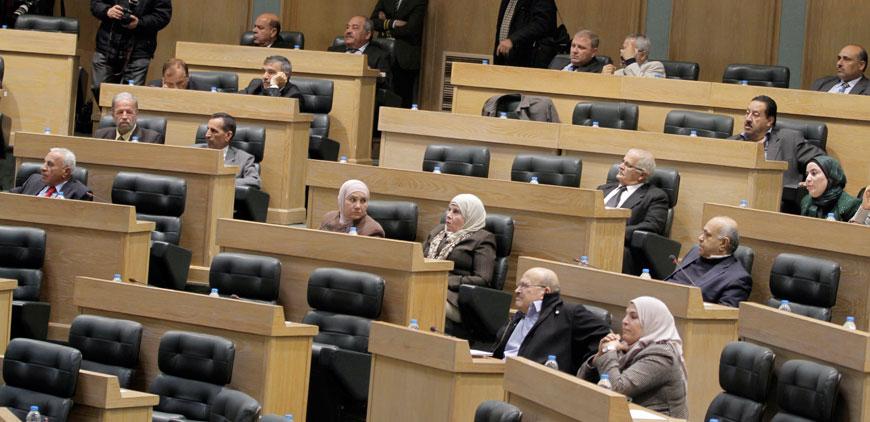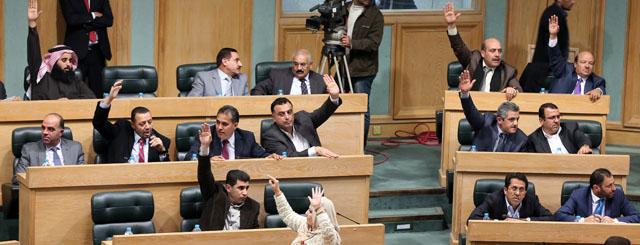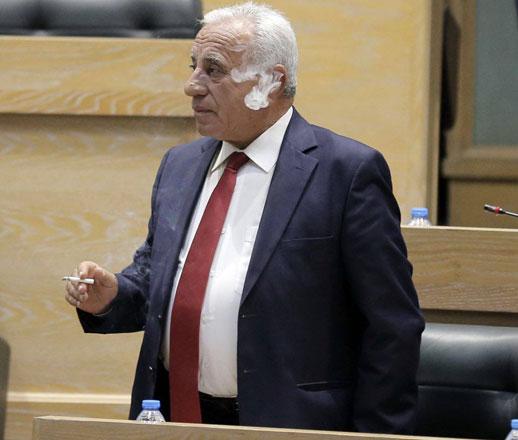You are here
Parliament is public place where smoking should be prohibited, senator argues
By Raed Omari - Mar 29,2016 - Last updated at Mar 29,2016

Lawmakers attend a Lower House session on Tuesday (Photo by Osama Aqarbeh)
AMMAN — Parliament is a public place by nature and is thus classified as among the non-smoking areas listed in the Public Health Law, a senator and former health minister said on Tuesday.
“Because Parliament, especially under the Dome, is a place where senators, deputies, ministers, citizens and even schoolchildren are frequently present, it is a public place by default,” Senator Yassin Husban said.
In its discussions of amendments to the anti-smoking Public Health Law on Monday, the Senate voted down a proposal to include Parliament as among the public places where smoking is prohibited.
“The proposal was rejected because we did not want to sound as if we were challenging the Lower House,” Husban told The Jordan Times. “As per the international health conventions Jordan signed, the two Houses of Parliament are among non-smoking places.”
The former minister also said that, under the World Health Organisation (WHO) Framework Convention on Tobacco Control which Jordan ratified in 2008, smoking should be prohibited at parliaments.
In 2014, the Senate endorsed a recommendation by its health committee to prohibit smoking under the Dome.
“The Senate president at the time ordered the removal of all ashtrays from under the Dome, and senators’ offices and meeting halls. Several Upper House members are smokers, including former premiers, but no one has ever smoked during sessions since 2014,” the senator added.
However, in previous remarks to The Jordan Times, head of the House Health and Environment Committee Deputy Raed Hijazeen noted that the Dome is not considered a public area, but a place that is designated for lawmakers, ministers and those who are permitted to attend the session.
“We hope that one day we can ban smoking under the Dome, which is a sort of a private room where lawmakers and government officials gather,” he said.
History is not encouraging. In 2004, noted the MP, lawmakers were banned from smoking, but meetings started to lose quorum when deputies left ongoing deliberations to smoke outside.
“This prompted the speaker to allow smoking inside,” Hijazeen, himself a smoker, noted earlier this month after the Lower House passed the 2015 amendments to the Public Health Law, stiffening the penalty for smoking in public places.
The House did not include the Dome as among the non-smoking areas despite some lawmakers’ demand.
Under the new amendments, a prison term from one to three months or a fine no less than JD100 and no more than JD200 will be imposed on those caught smoking cigarettes or any tobacco product in public places.
Under the law, a “public place” is defined as the place designed to receive the public or a certain category of people like hospitals and schools.
Jordanians’ annual consumption of cigarettes is estimated at around 1.7 million cartons at a cost of more than JD0.5 billion, according to official figures.
Around 34 per cent of Jordanians between the ages of 13 and 15 consume tobacco, while over 40 per cent of individuals within the same age group have tried tobacco products, according to WHO.
Tobacco consumption rate among Jordanians is expected to reach 50 per cent by 2025, WHO has said.
Related Articles
AMMAN — The Senate’s Health, Environment and Population Committee on Thursday insisted on its amendments to the Public Health Law under whic
Despite warning lawmakers against smoking under the Dome of Parliament, the majority of them still do so in violation of the Public Health Law, which prohibits smoking in public places.
AMMAN — The Lower House on Sunday approved a stricter version to the Public Health Law, which prohibits smoking in public areas.However, the















